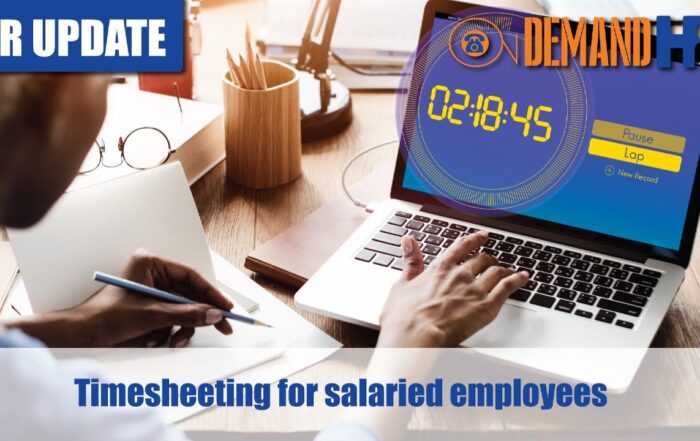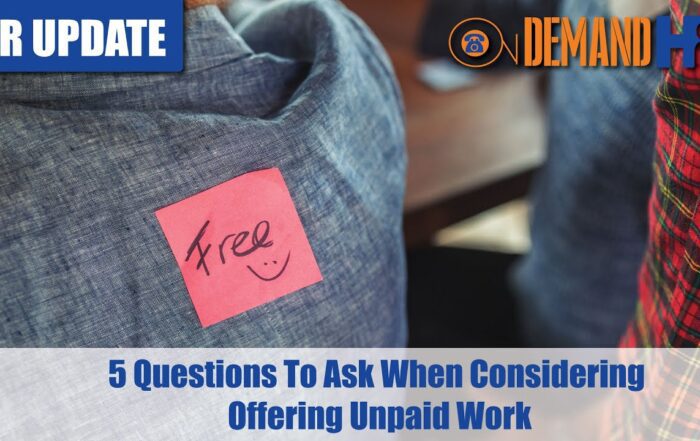Mandatory Vaccinations for non “high risk” industries
In this video we are going to be tackling and offering some of our thoughts on the highly charged topic of mandatory vaccinations in NSW workplaces specifically we discuss considerations for non “high risk” industries & workplaces.
If we are honest with you, we had significant internal debate on if we should be releasing any content on this subject, at the risk of polarising any individual or business owner as our observations have been that this issue is highly divisive and one which both businesses and individuals feel strongly one way or the other with little in the middle. Ultimately, we have resolved that we have an obligation to our audience to discuss the current state of play as at 11 August 2021, some of the proposed legislation in this space, the case for mandatory workplace vaccinations balanced against some of the inherent risks as well as our current advice in this space for clients.
We do this not to advocate one position or another, but rather to inform and let our audience in to some of the conversations we are having with business as well as internally and ultimately, allow individual businesses make a more informed decision with regards to a Workplace Relations Strategy that is right for them. The purposes of this video we will be sticking to the workplace relations side of this debate, and much of what we have to cover today will ultimately be decided in the courts and commissions, and therefore we must say that this commentary is for information purposes and prior to make any decisions we strongly encourage you to seek independent advice regarding your individual circumstances.
Share the HR or workplace relations challenge facing your business and one of our experienced consultants will be in touch within 24 hours with a strategic action plan or discover the best strategy yourself by accessing out free online training library.
Transcript
Hello, may name is Andrew Koleda from On Demand HR as today we are going to be tackling and offering some of our thoughts on the highly charged topic of mandatory vaccinations in NSW workplaces. If I am honest with you, we had significant internal debate on if we should be releasing any content on this subject, at the risk of polarising any individual or business owner as our observations have been that this issue is highly divisive and one which both businesses and individuals feel strongly one way or the other with little in the middle.
Ultimately, we have resolved that we have an obligation to our audience to discuss the current state of play as at 11 August 2021, some of the proposed legislation in this space, the case for mandatory workplace vaccinations balanced against some of the inherent risks as well as our current advice in this space for clients. We do this not to advocate one position or another, but rather to inform and let our audience in to some of the conversations we are having with
Ok, lets tackle the real meaty subject that has been on the mind of many workplaces across NSW and indeed Australia. The subject being bashed around the media. The elephant in the room. Can a business in any industry enforce a mandatory workplace vaccination policy and if so, should they?
The first part of this vexed question in our view is fairly simple. Today, yes a business can put in place a mandatory workplace vaccination policy. It’s already in the history books with examples of businesses who have already done this and reports of many businesses with the wheels in motion to follow suit.
However, for businesses who do put these practices in place, we expect there to be many test cases on whether or not such policies are “reasonable” either an unfair dismissal, adverse action, workers compensation, discrimination, or other complaints, and we expect that this will probably happen in the very near future.
With the lack of any other legislative guidance and Scott Morrison making it very clear on multiple occasions that employers must make their own decisions on this matter, it is ultimately left for businesses to contemplate the “reasonableness” of mandating vaccinations for their workplace.
So, as it stands today, you may be able to mandate vaccination for your workplace, but the real question is should you? Like all business decisions, it is our view that this should be done by weighing up the risk and rewards of the decision in an objective manner without bringing in personal views and perspectives. This way of thinking has shaped the way we have discussed this subject with our clients and empowered them to make the decision that is right for their business. So as a thought leader in this space we wanted to share some of the considerations that we feel you should take into account when making your own decision for your business.
Political views aside, the decision to mandate vaccinations in workplaces boils down to balancing a businesses obligation to provide a safe workplace for their employees, whilst also managing the risks to the business.
When it comes to the question of providing a safe workplace for their employees, it needs to be considered that the nature of the business may have an impact on the potential risk for employees with respect to contracting Covid-19 in the workplace. Both Federal and State Governments have already identified several higher risk industries including aged care, airport and quarantine workers requiring vaccination mandates and putting construction aside these largely make sense. The fact that the NSW government is currently debating weather the health care industry more broadly should be required to vaccinate from our perspective clearly indicates that there is currently no blanket approval for all industries to go forward and to mandate for their employees to get vaccinated.
To add to this, the current advice as at 11 August 2021 from Safe Work Australia is that it required of businesses to “minimise so far as reasonably practicable the risk of exposure to Covid-19 in the workplace”, but there is also commentary that “it is unlikely that a requirement for workers to be vaccinated would be reasonably practicable”. We can take from this at least from Safe Work Australia that they consider the businesses Covid Safe Plan, and other control measures to be meeting with the employers obligation to provide a safe workplace for their employees, and steps beyond this including mandatory vaccination would be above this obligation. However, we accept that some businesses may choose to go above and beyond their current obligations from Safe Work Australia and for those businesses we encourage them to factor in and consider potential risks before taking action.
When it comes to risk and liability from a HR & Workplace Relations perspective their appears to be much for businesses to consider. Should a commission or tribunal consider a mandatory workplace vaccination policy to be unreasonable, it can expose businesses to unfair dismissal, adverse action and other types of claims. To make this matter more of a concern, it is likely that the test of reasonableness may be taken on a case by case basis depending on the specific risk factors of varying types of businesses. What this means in practice is that businesses are being asked in what is an already a challenging time is to all seek individual advice and bear the costs of this advice to make a determination of the reasonableness of such a directive. Further if that advice is taken to be incorrect in hindsight as the result of some type of claim to bear the legal costs of defending such a decision on top of any potential compensation for the employee subject to the directive is awarded. It is not too far of a stretch to see the some segments of the legal fraternity start looking at which super car they want to purchase next.
However, another significant risk is the labour market risk. Immediately prior to the recent round of lockdowns across the country, it was reported that the unemployment rate was at 4.9%, meaning very few people were left available on the labour market. With conscientious objectors likely to be in every workplace, does a mandatory vaccination policy risk alienating or leading to an exit of some employees, with difficulty in replacing them? Does this also mean that the business can no longer draw from all of the labour market, but rather the 70% or 80% that are vaccinated?
Pair this with the potential implications of an independent members bill introduced for debate from Fred Nile in February 2021 suggesting that employers should be responsible for the liability should an adverse reaction to a vaccination occur.
In summary, the issue we are wrestling with is managing the risks of transmission and how much vaccination may reduce this in a workplace vs implementing a mandatory vaccination program which for some businesses may lead to other risks including employment claims, key talent leaving, and reduced capacity to find alternatives.
We don’t have all the answers, right and wrong is unclear in this debate, but we look forward to hearing from you to discuss your circumstances.
Finally, if you are watching this on social media, this is an extract from a longer session on this subject matter where we tackle this challenging question from multiple angles and perspectives and you can view the entire session on our website at ondemandhr.com.au.
From the entire team here at On Demand HR we hope that you are staying safe and we are ready and available to help support your business in any way that we can.






